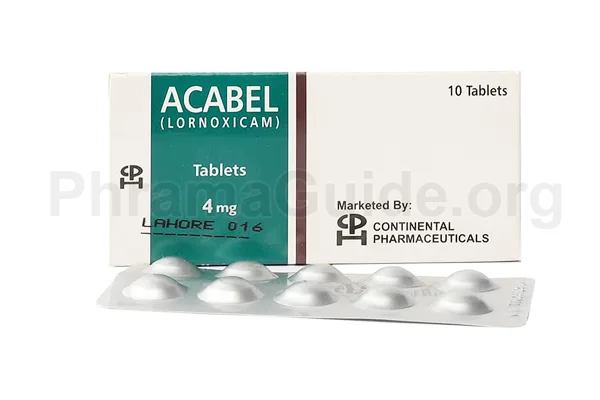Acabel tablet is primarily used for the management of pain and inflammation associated with various conditions. It is a nonsteroidal anti-inflammatory drug (NSAID) that belongs to the oxicam class. Following are some common and off-label uses of Acabel Tablets:
Common Uses of Acabel Tablet
- Pain Management: Acabel tablet is used to relieve pain associated with various conditions, including musculoskeletal disorders (such as rheumatoid arthritis, osteoarthritis, and ankylosing spondylitis), dental pain, and acute gouty arthritis.
- Inflammatory Conditions: Acabel tablet is effective in reducing inflammation associated with conditions like rheumatoid arthritis and osteoarthritis. Using Acabel tablets helps alleviate symptoms such as joint swelling, pain, and stiffness.
- Acute Gouty Arthritis: Acabel tablets can be used for the short-term management of acute gouty arthritis, which is characterized by sudden and severe joint inflammation caused by the deposition of uric acid crystals in the joints.
- Postoperative Pain: Acabel tablet is commonly used after surgery to manage postoperative pain and reduce inflammation at the surgical site.
- Dysmenorrhea: Acabel tablets may be used to alleviate pain associated with dysmenorrhea, which refers to painful menstrual cramps experienced by some women.
Off-label Uses of Acabel Tablet
- Migraine: Acabel tablets may be used off-label for the treatment of acute migraine attacks. Using Acabel can help relieve pain and reduce inflammation associated with migraines, although specific migraine-specific medications are typically preferred.
- Low Back Pain: Acabel tablets may be used for the management of acute or chronic low back pain. Using Acabel can help alleviate pain and reduce inflammation associated with this condition.
- Sports Injuries: Acabel tablets may be used for the treatment of sports-related injuries, such as sprains, strains, or ligament injuries. Using Acabel can help reduce the pain and inflammation associated with these injuries.

What is Acabel?
Acabel is one of the leading brands of Lornoxicam, manufactured and marketed by Continental Pharmaceuticals (Pvt) Ltd, Pakistan.
Acabel Alternatives : Other Similar Brands
The following are some alternative brands of Acabel and their manufacturers.
- Xika-Rapid : Hilton Pharmaceuticals (Pvt) Ltd. Pakistan
- Orno : Sami Pharmaceuticals (Pvt) Ltd. Pakistan
- Zafon Fast : Getz Pharmaceuticals (Pvt) Ltd. Pakistan
- Actcam : Atco Laboratories (Pvt) Ltd. Pakistan
- Spedicam : Pharmevo Pakistan (Pvt) Ltd
- Mobirom : Saffron Pharmaceuticals (Pvt) Ltd. Pakistan
- Lonex : Mcolson Research Laboratories. Pakistan
- Xoni-Fast : Macter International (Pvt) Ltd. Pakistan
- Olaway : Horizon Pharmaceuticals Pvt Ltd. Pakistan
- Lorzaf : Dyson Research Laboratories. Pakistan
Acabel : Available Formulations and Strengths
Presently, Acabel is available in Tablet and Injection Forms with the following strengths.
Acabel Tablets : 4mg and 8mg strengths.
Acabel Injection : 8mg/2ml strength.
Who Should Not Use Acabel?
Acabel has certain contraindications, which are specific situations or conditions in which the use of the medication is not recommended or should be avoided.
Hypersensitivity: Acabel is contraindicated in individuals who have a known hypersensitivity or allergic reaction to Acabel or any other NSAIDs. Allergic reactions to NSAIDs can range from mild skin reactions to severe allergic reactions, including anaphylaxis, which is a life-threatening condition.
Aspirin or other NSAID-induced asthma, rhinitis, or urticaria: Acabel is contraindicated in individuals who have a history of asthma, rhinitis (inflammation of the nasal passages), or urticaria (hives) induced by aspirin or other NSAIDs. These individuals may be at an increased risk of experiencing an allergic reaction or exacerbation of their condition.
Severe renal impairment: Acabel is contraindicated in individuals with severe renal impairment (creatinine clearance less than 30 mL/min). Acabel is primarily eliminated from the body through the kidneys, and impaired renal function can lead to the accumulation of Acabel, potentially increasing the risk of adverse effects.
Active peptic ulcer or gastrointestinal bleeding: Acabel is contraindicated in individuals with active peptic ulcer disease (ulcers in the stomach or duodenum) or a history of gastrointestinal bleeding. NSAIDs, including Acabel, can increase the risk of gastric or intestinal ulcers and gastrointestinal bleeding.
Severe liver impairment: Acabel is contraindicated in individuals with severe liver impairment. Acabel is primarily metabolized in the liver, and impaired liver function can lead to the accumulation of Acabel and potential adverse effects.
Pregnancy and breast-feeding: Acabel is generally contraindicated during pregnancy, especially in the third trimester, as it may harm the developing fetus. It is also not recommended during breastfeeding, as it may be excreted into breast milk and could potentially harm the nursing infant.
What is the Recommended Daily Dosage of Acabel?
Acabel Dose for Pain and Inflammation:
- One tablet of 8mg per day, taken as a single daily dose or divided into two doses (4mg tablet twice daily).
- The maximum daily dose should not exceed 16 mg.
Acabel Dose for Rheumatoid Arthritis and Osteoarthritis:
- Three tablets of 4mg per day, taken as a single daily dose or divided into three doses (4mg thrice daily).
- The maximum daily dose should not exceed 16 mg.
Acabel Dose for Acute Gouty Arthritis:
- Two tablets of 8mg per day, taken as a single daily dose or divided into two doses (8 mg twice daily).
- The duration of treatment for acute gouty arthritis is typically short-term.
How Acabel Works?
Acabel works by inhibiting cyclooxygenase (COX) enzymes, specifically COX-1 and COX-2, which are responsible for the production of prostaglandins, substances involved in inflammation and pain signaling.

Leave A Comment